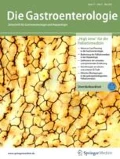Zusammenfassung
Hintergrund
Infektionskrankheiten des Magen-Darm-Trakts nehmen weltweit zu.
Ziel der Arbeit
Folgende Fragen sollten beantwortet werden: Wie hat sich die Inzidenz infektiöser Durchfallerkrankungen in den letzten 10 Jahren in Deutschland verändert? Welche gesundheitsökonomische Bedeutung haben diese Erkrankungen im stationären Bereich?
Material und Methoden
Hierzu wurden Daten des Statistischen Bundesamts und des Robert Koch-Instituts sowie aktuelle Veröffentlichungen ausgewertet.
Ergebnisse
Die Zahl der stationär behandelten Patienten mit infektiösen Darmerkrankungen und ihre Mortalitätsrate steigen an. Berücksichtigt man die Gruppe der stationären Patienten, bei denen die Infektionen des Magen-Darm-Trakts als Hauptdiagnose verschlüsselt wurden, haben sich die Krankheitsfälle 2011 im Vergleich zum Jahr 2000 verdoppelt. Hauptsächlich dafür verantwortlich sind Infektionen mit Clostridium difficile (99.779 Fälle, Haupt- und Nebendiagnosen 2011), Noro- und Rotaviren. Am Beispiel der Infektionen mit Clostridium difficile lässt sich zeigen, dass diese Entwicklung mit hohen Folgekosten verbunden ist, die zu einer erheblichen Unterdeckung der erstatteten Fallpauschalen führen.
Schlussfolgerung
Die deutliche Zunahme der Inzidenz infektiöser Durchfallerkrankungen hat nicht nur medizinische, sondern auch gesundheitsökonomische Auswirkungen. Vordringliche Maßnahmen sind eine verbesserte Fort- und Weiterbildung für Gastroenterologen auf dem Gebiet der gastroenterologischen Infektionskrankheiten und die Anpassung der erstatteten Krankenhauspauschalen an die tatsächlichen Kosten.
Abstract
Background
There is a worldwide increase in gastrointestinal infectious diseases.
Aim
To investigate the incidence of gastrointestinal infections in Germany over the last 10 years and the health-economic impact of these diseases on the inpatient area.
Material and methods
In this study data from the Federal Statistical Office, the Robert Koch Institute and from current publications were analyzed.
Results
The incidence of and mortality from gastrointestinal infections among inpatients are rising in Germany. The number of patients with a diagnosis of infections of the gastrointestinal tract (ICD 10 A00-A09) as the principal diagnosis doubled between 2000 and 2011. Infections with Clostridium difficile (99,779 cases in 2011, principle or secondary diagnosis), norovirus and rotavirus were the main pathogens responsible for the increase. Using Clostridium difficile as an example it could be shown that this development not only represents a significant health burden but also leads to inadequate reimbursement of hospital expenditure.
Conclusion
The increased incidence of infectious gastrointestinal diseases has not only medical but also a health-economic impact. Appropriate measures would include an expanded infectious diseases curriculum in further and continuous training for gastroenterologists as well as an adjustment of reimbursements in order to cover the actual costs.


Literatur
Buchholz U, Bernard H, Werber D et al (2011) German outbreak of Escherichia coli O104:H4 associated with sprouts. N Engl J Med 365:1763–1770
Rasko DA, Webster DR, Sahl JW et al (2011) Origins of the E. coli strain causing an outbreak of hemolytic-uremic syndrome in Germany. N Engl J Med 365:709–717
Trachtman H (2012) Escherichia coli O104:H4 outbreak in Germany. N Engl J Med 366:766–767
Lynen Jansen P, Stallmach A, Lohse A, Lerch MM (2014) Entwicklung infektiöser Durchfallerkrankungen zwischen den Jahren 2000 und 2012. Z Gastroenterol (im Druck)
Robert Koch-Institut (2013) Schwer verlaufende Clostridium-difficile-Infektionen: IfSG-Surveillancedaten von 2011 und 2012. Epidemiol Bulletin 25. http://www.rki.de
Robert Koch-Institut (2012) Infektionsepidemiologisches Jahrbuch meldepflichtiger Krankheiten. RKI, Berlin
Di Bella S, Musso M, Cataldo MA et al (2013) Clostridium difficile infection in Italian urban hospitals: data from 2006 through 2011. BMC Infect Dis 13:146
Bartlett JG (2006) Narrative review: the new epidemic of Clostridium difficile-associated enteric disease. Ann Intern Med 145:758–764
Redelings MD, Sorvillo F, Mascola L (2007) Increase in Clostridium difficile-related mortality rates, United States, 1999–2004. Emerg Infect Dis 13:1417–1419
Grube RF, Heinlein W, Scheffer H et al (2014) Ökonomische Auswirkungen einer Clostridium difficile Enterokolitis in deutschen Krankenhäusern auf der Basis von DRG-Kostendaten. Z Gastroenterol (im Druck)
Schmidt C, Köhler S, Kräplin T et al (2014) Does the hospital cost of care differ for inflammatory bowel disease patients with or without gastrointestinal infections? A case-control study. (im Druck)
Einhaltung ethischer Richtlinien
Interessenkonflikt. P. Lynen Jansen, M. Ebert, A. Stallmach, A.W. Lohse, M.M. Lerch geben an, dass kein Interessenkonflikt besteht. Der Beitrag enthält keine Studien an Menschen oder Tieren.
Author information
Authors and Affiliations
Corresponding author
Rights and permissions
About this article
Cite this article
Jansen, P., Ebert, M., Stallmach, A. et al. Entwicklung infektiöser Gastroenteritiden in Deutschland. Gastroenterologe 9, 342–349 (2014). https://doi.org/10.1007/s11377-014-0883-6
Published:
Issue Date:
DOI: https://doi.org/10.1007/s11377-014-0883-6

